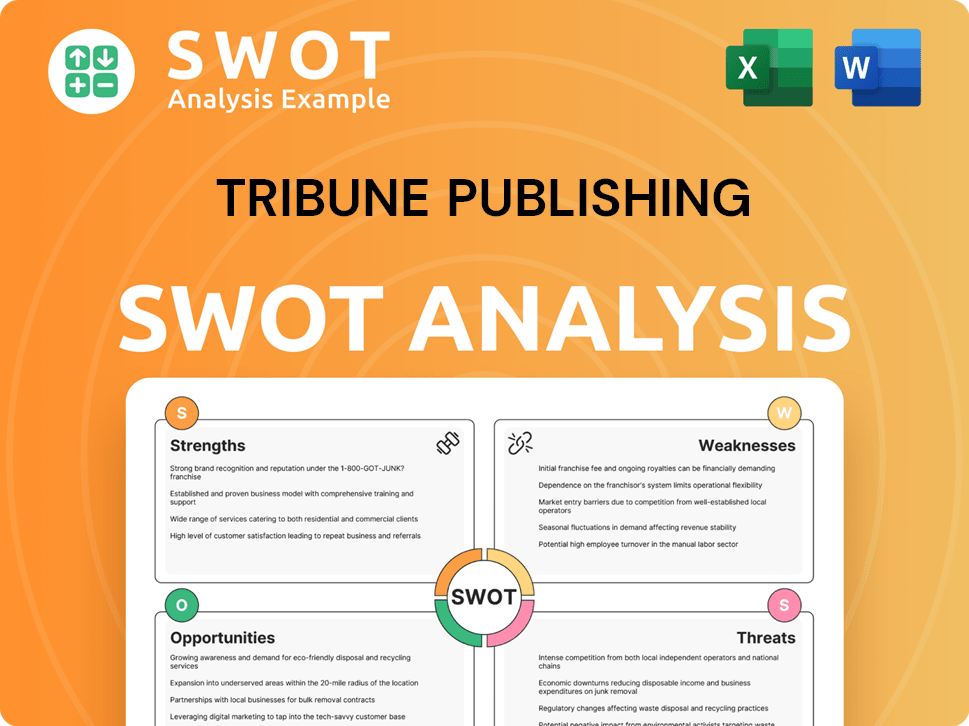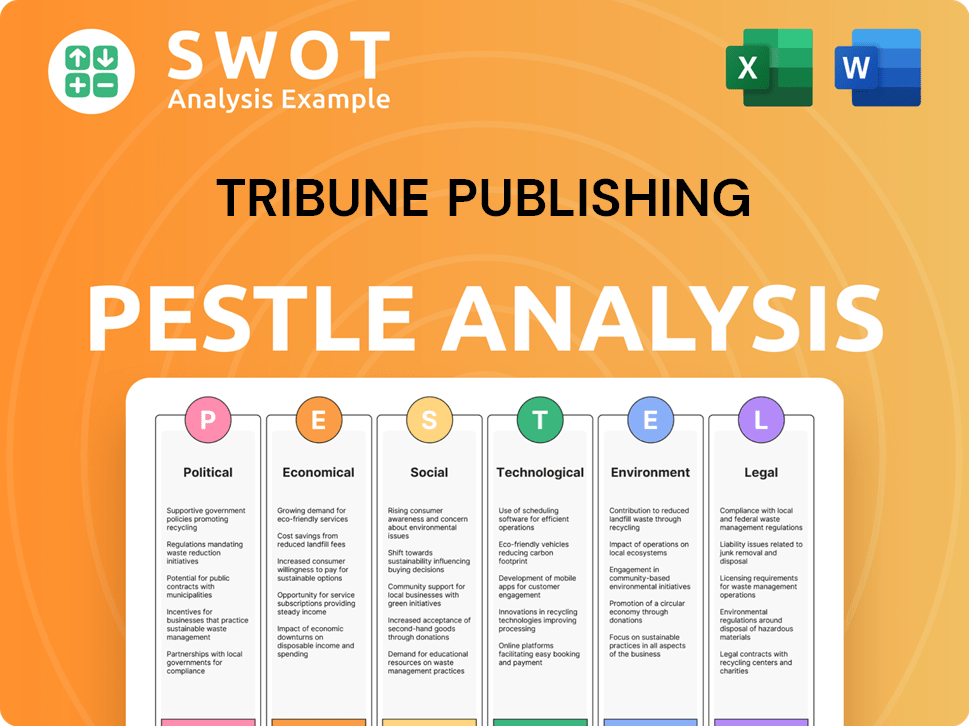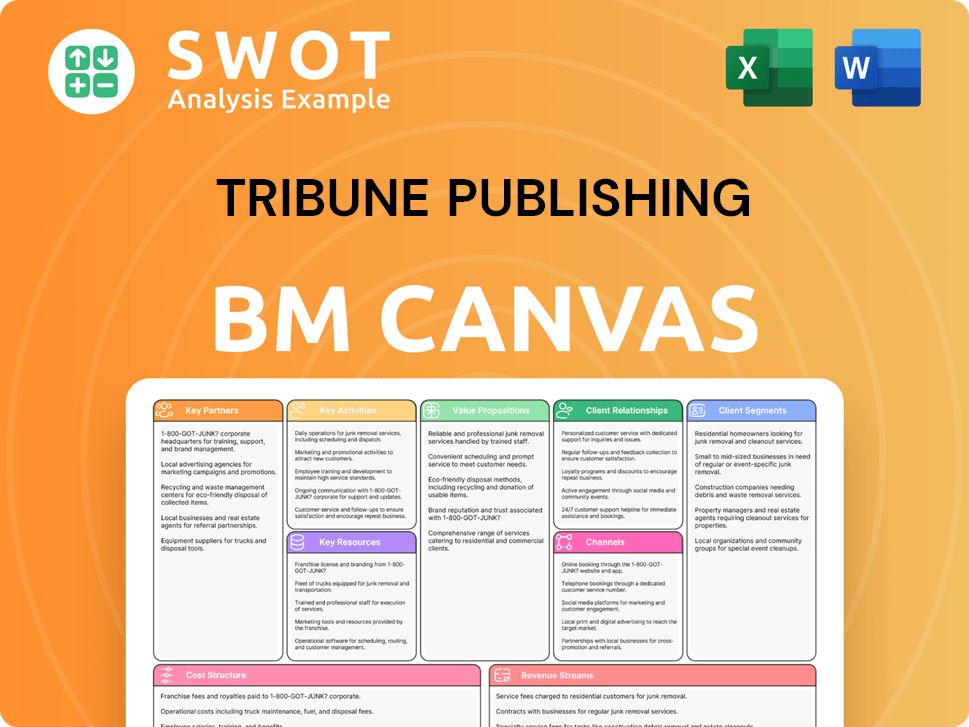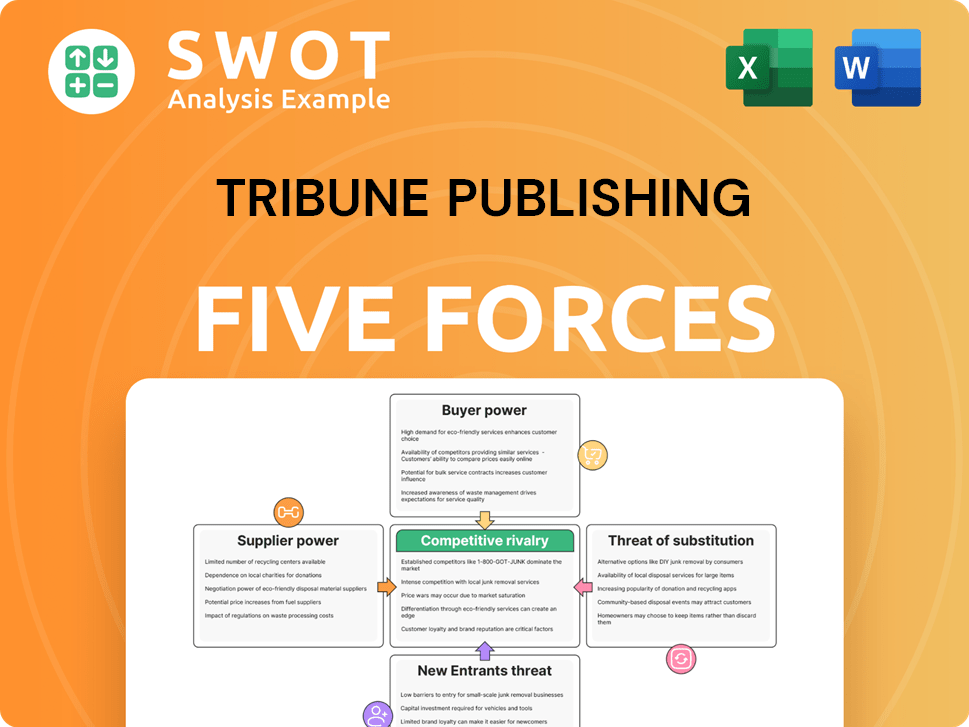Tribune Publishing Bundle
Who Really Controls Tribune Publishing Company?
Uncover the ownership secrets of the Tribune Publishing SWOT Analysis, a media giant that has shaped American journalism for over a century. From its roots as the Chicago Tribune to its current status as Tribune Enterprises, LLC, understanding who owns this influential newspaper publisher is critical. The company's trajectory has been marked by significant shifts in control, impacting its editorial independence and strategic direction.

This deep dive into Tribune ownership reveals the forces at play, from the founding fathers to the hedge funds now steering its course. The acquisition by Alden Global Capital in 2021 dramatically reshaped the landscape, raising questions about the future of local news and the influence of financial interests. Exploring the history of the Chicago Tribune and its evolution as a media company offers crucial insights into its current operations and future prospects, including its financial performance and the impact on its subsidiaries.
Who Founded Tribune Publishing?
The origins of Tribune Publishing Company, formerly known as Tribune Company, are rooted in the founding of the Chicago Tribune in 1847. The newspaper was established by James Kelly, John E. Wheeler, and Joseph K.C. Forrest. These individuals, with backgrounds in printing and journalism, aimed to provide news and commentary to the growing population of Chicago.
Early ownership of the Chicago Tribune involved a partnership among the founders, with initial stakes likely determined by their capital contributions. Over time, the ownership structure evolved as new partners joined and others left. Joseph Medill, who acquired a one-third interest in 1855, became a significant figure, shaping the Tribune's editorial direction and business strategy for decades. Early investors often included local businesspeople and political figures who recognized the value of a strong journalistic voice.
These initial stages of ownership were characterized by the direct involvement of the owners in daily operations. Their individual visions significantly influenced the publication's content and business strategy. Early agreements would have focused on operational responsibilities and profit sharing among the partners, setting the foundation for the company's future corporate structure.
James Kelly, John E. Wheeler, and Joseph K.C. Forrest founded the Chicago Tribune in 1847. They were primarily involved in printing and journalism.
The initial ownership structure involved a partnership among the founders, with stakes based on capital contributions. Specific equity splits are not readily available from this early period.
Joseph Medill acquired a one-third interest in 1855 and later gained full control. He significantly influenced the Tribune's editorial direction and business strategies.
Early investors often included local businesspeople and political figures. They recognized the value of a strong journalistic voice.
Early ownership involved direct involvement in day-to-day operations. Owners' visions strongly influenced content and business strategy.
Early agreements focused on operational responsibilities and profit sharing. These agreements set the foundation for the company's future corporate structure.
Understanding the initial ownership structure of the Tribune Publishing Company provides insight into its early development. The founders' vision and subsequent changes in ownership shaped the company's direction. The influence of figures like Joseph Medill was crucial. For more on the company's strategic growth, consider reading about the Growth Strategy of Tribune Publishing.
- The Chicago Tribune was founded in 1847 by James Kelly, John E. Wheeler, and Joseph K.C. Forrest.
- Early ownership was a partnership, with stakes likely based on capital contributions.
- Joseph Medill, who acquired a one-third interest in 1855, became a dominant figure.
- Early backers included local businesspeople and political figures.
Tribune Publishing SWOT Analysis
- Complete SWOT Breakdown
- Fully Customizable
- Editable in Excel & Word
- Professional Formatting
- Investor-Ready Format

How Has Tribune Publishing’s Ownership Changed Over Time?
The evolution of Tribune Publishing Company's ownership reflects a dynamic history within the media industry. Initially a public company listed on the New York Stock Exchange since 1983, its ownership transitioned from family control to a broader shareholder base, including institutional investors and mutual funds. A significant shift occurred in 2007 when the company was taken private through a leveraged buyout, which led to bankruptcy in 2008. The company emerged from bankruptcy in 2012.
Following its restructuring, Tribune Publishing Company was established in 2014, separating its publishing assets from its broadcasting and digital holdings. Michael Ferro's Merrick Ventures became a key shareholder in 2016. The most recent major change happened in May 2021, when Alden Global Capital acquired the remaining shares, taking Tribune Publishing private for approximately $630 million. As of early 2025, Alden Global Capital remains the sole owner of Tribune Enterprises, LLC, controlling all strategic and operational decisions.
| Timeline Event | Ownership Change | Impact |
|---|---|---|
| 1983 | Initial Public Offering (IPO) | Transition from private to public ownership. |
| 2007 | Leveraged Buyout led by Sam Zell | Company taken private, leading to bankruptcy. |
| 2014 | Spinoff of Publishing Assets | Creation of Tribune Publishing Company. |
| 2016 | Michael Ferro becomes a significant shareholder | Shift in shareholder influence. |
| May 2021 | Alden Global Capital Acquisition | Company taken private; Alden becomes sole owner. |
Alden Global Capital's acquisition of Tribune Publishing in 2021 for $17.25 per share marked a pivotal moment. This move, valued at around $630 million, consolidated ownership under the hedge fund's control. As of the latest reports, the company's strategic direction is heavily influenced by Alden Global Capital's cost-cutting strategies, a common practice in the newspaper industry. The shift to private ownership has significantly altered the operational landscape of this media company.
The ownership of Tribune Publishing has seen significant changes over time, from public trading to private control.
- Alden Global Capital is the current sole owner.
- The company went through a leveraged buyout and subsequent bankruptcy.
- The acquisition in 2021 took the company private.
- The shift to private ownership has impacted the operational strategies.
Tribune Publishing PESTLE Analysis
- Covers All 6 PESTLE Categories
- No Research Needed – Save Hours of Work
- Built by Experts, Trusted by Consultants
- Instant Download, Ready to Use
- 100% Editable, Fully Customizable

Who Sits on Tribune Publishing’s Board?
Following the privatization of Tribune Publishing Company in May 2021 by Alden Global Capital, the composition and function of the Board of Directors have been significantly altered. As a privately held entity, the board now primarily comprises representatives from Alden Global Capital and individuals aligned with its interests. This shift reflects a consolidation of control, with decision-making authority concentrated within Alden Global Capital and its appointed board members. Details on specific board members for the privately held Tribune Enterprises, LLC, are not publicly disclosed in the same manner as for public companies.
Before the acquisition, when Tribune Publishing was publicly traded, the board included independent directors, management representatives, and shareholders. The voting structure was typically one-share-one-vote for common stock. However, activist investors, such as Alden Global Capital, influenced the board and management, which led to the acquisition. Now, Alden Global Capital holds the complete voting power, and the board is accountable to them. This structure allows for more streamlined decision-making but also raises concerns about journalistic resources and editorial independence, as the board's primary duty is now to Alden Global Capital. For more insights, consider reading about the Growth Strategy of Tribune Publishing.
Alden Global Capital's acquisition of Tribune Publishing Company has centralized control over the media company. Alden's representatives now dominate the board, influencing strategic decisions and resource allocation.
- The board's primary allegiance is to Alden Global Capital.
- Decision-making is streamlined but may impact journalistic independence.
- Public disclosure of board members is limited compared to public companies.
Tribune Publishing Business Model Canvas
- Complete 9-Block Business Model Canvas
- Effortlessly Communicate Your Business Strategy
- Investor-Ready BMC Format
- 100% Editable and Customizable
- Clear and Structured Layout

What Recent Changes Have Shaped Tribune Publishing’s Ownership Landscape?
The most significant shift in Tribune Publishing Company's ownership in the last few years has been its acquisition by Alden Global Capital in May 2021. This move saw Alden, which had been increasing its stake, take the company private. The deal was valued at roughly $630 million. This change reflects a broader trend of consolidation in the media industry, with hedge funds and private equity firms playing a larger role in the newspaper sector.
Since the acquisition, Tribune Publishing, now operating as Tribune Enterprises, LLC, has been under Alden Global Capital's ownership. Alden is known for its cost-cutting strategies, a pattern observed in other newspaper chains it has acquired. While specific financial details are not publicly available for the privately held Tribune Enterprises, LLC, industry analysts continue to watch how Alden's ownership impacts the company's various publications. The shift from public to private ownership has changed the dynamics of the company, impacting its operations and strategic direction.
The media industry faces ongoing challenges, including declining advertising revenue and the move towards digital subscriptions. This financial pressure often leads to media company consolidations, making them attractive targets for investors aiming to streamline operations and boost profitability. As of early 2025, there have been no public announcements from Alden Global Capital regarding a re-listing of Tribune Publishing or any immediate ownership changes. The current focus remains on optimizing the existing portfolio under private ownership.
Alden Global Capital acquired Tribune Publishing in May 2021.
The acquisition was valued at around $630 million.
The company is now operating as Tribune Enterprises, LLC.
Media consolidation is a key trend.
Declining advertising revenue is a significant challenge.
Shift towards digital subscriptions is ongoing.
Tribune Publishing Porter's Five Forces Analysis
- Covers All 5 Competitive Forces in Detail
- Structured for Consultants, Students, and Founders
- 100% Editable in Microsoft Word & Excel
- Instant Digital Download – Use Immediately
- Compatible with Mac & PC – Fully Unlocked

Related Blogs
- What are Mission Vision & Core Values of Tribune Publishing Company?
- What is Competitive Landscape of Tribune Publishing Company?
- What is Growth Strategy and Future Prospects of Tribune Publishing Company?
- How Does Tribune Publishing Company Work?
- What is Sales and Marketing Strategy of Tribune Publishing Company?
- What is Brief History of Tribune Publishing Company?
- What is Customer Demographics and Target Market of Tribune Publishing Company?
Disclaimer
All information, articles, and product details provided on this website are for general informational and educational purposes only. We do not claim any ownership over, nor do we intend to infringe upon, any trademarks, copyrights, logos, brand names, or other intellectual property mentioned or depicted on this site. Such intellectual property remains the property of its respective owners, and any references here are made solely for identification or informational purposes, without implying any affiliation, endorsement, or partnership.
We make no representations or warranties, express or implied, regarding the accuracy, completeness, or suitability of any content or products presented. Nothing on this website should be construed as legal, tax, investment, financial, medical, or other professional advice. In addition, no part of this site—including articles or product references—constitutes a solicitation, recommendation, endorsement, advertisement, or offer to buy or sell any securities, franchises, or other financial instruments, particularly in jurisdictions where such activity would be unlawful.
All content is of a general nature and may not address the specific circumstances of any individual or entity. It is not a substitute for professional advice or services. Any actions you take based on the information provided here are strictly at your own risk. You accept full responsibility for any decisions or outcomes arising from your use of this website and agree to release us from any liability in connection with your use of, or reliance upon, the content or products found herein.